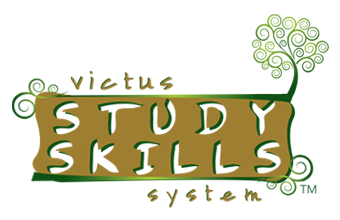Yesterday I went to see my 7-year-old grandson display the basic horsemanship skills he had learned during a week of horse camp.
I took my seat in the bleachers with my daughter and her two daughters, and we listened as the announcer gave commands and the campers obeyed: stopping their horses, turning them, riding sidesaddle, dismounting their horses.
My horse-loving 12-year-old granddaughter sitting with me had not yet seen pictures of her horse-smitten cousin in her recent horse show, jumping and doing all sorts of maneuvers, clearly learned from years of lessons and practice. As I showed her the photos on my phone and watched my grandson, I remembered our Victus Study Skills System motto: “Success starts with the basics.”
This reminded me of the encouraging homeschool convention my husband and I had recently attended. Countless families talked with us about the problem that students are not taught the basics of how to study. We discussed the fact that we don’t throw kids into a lake to teach them to swim. We teach them incremental skills like holding fingers together to cup hands and kicking feet and breathing. They learn much in swimming that is counterintuitive: Lie flat. Put your face in the water. Then you will go farther, faster, with less effort. Yet, when it comes to study, we throw them into a lake.
Then I remembered you, the readers of this article.
I remembered how most of you indicate through emails and conversations that you have had to teach yourselves how to teach. Understandably, learning the lessons you need to teach takes precedence over learning how to teach. You’ve been thrown into the proverbial lake!
Having an education degree and having taught every age over a 50-year career, I’ve learned and continue to learn some crucial lessons about teaching. Hopefully, the thoughts I will share in this series will help you do some counterintuitive things that will make your teaching more effective.
As a teacher, you must master the art of persuasion. Aristotle identified three components of persuasion, or proofs, known as ethos, logos, and pathos. Ethos refers to the credibility of the speaker. Pathos draws on emotions. Logos refers to the logic of the message.
One of my most effective teachers was the world-renowned statistician W. Edwards Deming, whom I met in a seminar he was teaching when he was 91 years old. He had mastered the art of persuasion, but not in the slick way you may think.
As I and others watched Deming slowly climb the stairs, he held us spellbound as he walked to the center of the bare stage, stopped, and looked at us. In a gruff, monotone voice, he bluntly said words I will never forget:
“I have not come here to entertain you.”
He spoke little, but when he did, he dumbfounded with questions such as, “How many of you are not willing workers?” His point was that most workers want to do a good job—most are willing—but that often the processes bosses put in place prevent good work from willing workers. Unclear job descriptions and processes, or insufficient resources hamper the work. If anyone questioned his credibility before he spoke, once he did speak, his credibility was confirmed. He made his words count. His Socratic approach was thought provoking.
Like Deming, you must be a credible source in the eyes of your kiddos. How? Study your subject. Know it. Prepare your lessons faithfully. If you don’t know an answer, don’t worry; instead, search out the answer with your kids. Learn with and from them.

